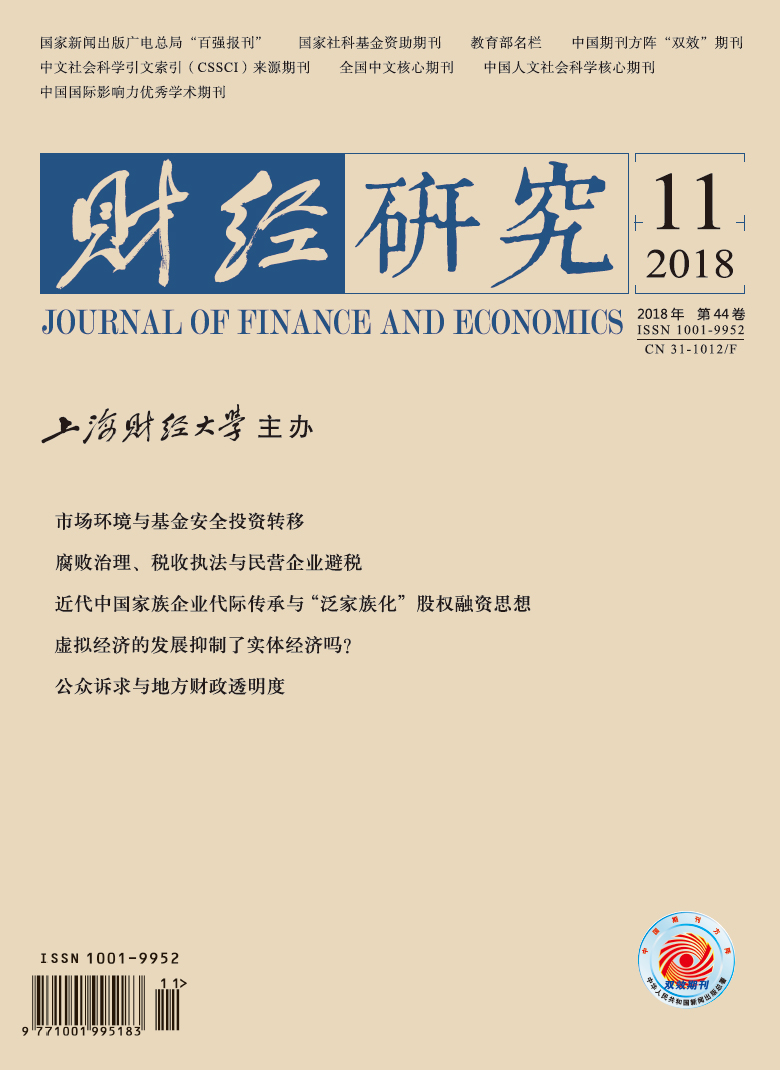威胁是利益主体之间博弈常用的手段,通过施加压力迫使对方做出退让,进而影响博弈的均衡策略。在公司治理中,退出威胁是大股东实现其治理目标的重要手段,但是由于难以直接观察,学术界未能给予足够的重视。文章将社会心理学的概念引入公司治理研究框架中,以2007−2015年中国沪深A股17 080个观察样本为研究对象,检验了外部大股东的退出威胁可能存在的“治理假说”和“合谋假说”,并基于卖空机制、股价财富敏感性和市值管理敏感性进行了异质性分析。研究发现,外部大股东退出威胁的“治理假说”成立,即退出威胁可以有效发挥盈余管理治理作用,而且这一治理效应在可卖空及股价财富敏感性和市值管理敏感性较高的企业中更加显著。文章的研究证实了退出威胁会对企业决策产生实质性影响,揭示了资本市场压力传导到实体经济的路径,为公司治理的完善提供了新思路。
退出威胁与公司治理——基于盈余管理的视角
摘要
参考文献
2 褚剑,方军雄. 中国式融资融券制度安排与股价崩盘风险的恶化[J]. 经济研究,2016,(5):143−158 DOI:10.3969/j.issn.1002-5863.2016.05.054
7 李增福,周婷. 规模、控制人性质与盈余管理[J]. 南开管理评论,2013,(6):81−94 DOI:10.3969/j.issn.1008-3448.2013.06.009
8 李志生,陈晨,林秉旋. 卖空机制提高了中国股票市场的定价效率吗?——基于自然实验的证据[J]. 经济研究,2015,(4):165−177 DOI:10.3969/j.issn.1673-291X.2015.04.072
9 潘越,戴亦一,魏诗琪. 机构投资者与上市公司" 合谋”了吗:基于高管非自愿变更与继任选择事件的分析[J]. 南开管理评论,2011,(2):69−81 DOI:10.3969/j.issn.1008-3448.2011.02.009
12 祝继高,叶康涛,陆正飞. 谁是更积极的监督者:非控股股东董事还是独立董事?[J]. 经济研究,2015,(9):170−184 DOI:10.3969/j.issn.1672-5719.2015.09.147
13 Bebchuk L A, Brav A, Jiang W. The long-term effects of hedge fund activism[R].NBER Working Paper No.21227, 2015.
14 Bharath S T,Jayaraman S,Nagar V. Exit as governance:An empirical analysis[J]. The Journal of Finance,2013,68(6): 2515−2547. DOI:10.1111/jofi.12073
15 Brav A,Jiang W,Partnoy F,et al. Hedge fund activism,corporate governance,and firm performance[J]. The Journal of Finance,2008,63(4): 1729−1775. DOI:10.1111/j.1540-6261.2008.01373.x
16 Chaney T,Sraer D,Thesmar D. The collateral channel:How real estate shocks affect corporate investment[J]. The American Economic Review,2012,102(6): 2381−2409. DOI:10.1257/aer.102.6.2381
17 Chen J Z, Rees L L, Sivaramakrishnan S. On the use of accounting vs. real earnings management to meet earnings expectations: A market analysis[R]. Working Paper, 2010.
18 Chen Q,Chen X,Schipper K,et al. The sensitivity of corporate cash holdings to corporate governance[J]. The Review of Financial Studies,2012,25(12): 3610−3644. DOI:10.1093/rfs/hhs099
19 Deutsch M,Krauss R M. Studies of interpersonal bargaining[J]. Journal of Conflict Resolution,1962,6(1): 52−76. DOI:10.1177/002200276200600107
20 Djankov S,La Porta R,Lopez-de-Silanes F,et al. The law and economics of self-dealing[J]. Journal of Financial Economics,2008,88(3): 430−465. DOI:10.1016/j.jfineco.2007.02.007
21 Dou Y W, Hope O K, Thomas W B, et al. Blockholder exit threats and financial reporting quality[R]. Rotman School of Management Working Paper No.2374770, University of Toronto, 2016.
22 Dou Y W,Khan M,Zou Y L. Labor unemployment insurance and earnings management[J]. Journal of Accounting and Economics,2016,61(1): 166−184. DOI:10.1016/j.jacceco.2015.06.001
23 Edmans A,Fang V W,Zur E. The effect of liquidity on governance[J]. The Review of Financial Studies,2013,26(6): 1443−1482. DOI:10.1093/rfs/hht012
24 Edmans A, Holderness C G. Blockholders: A survey of theory and evidence[A]. Hermalin B, Weisbach M. The handbook of the economics of corporate governance[C]. North Holland, 2017.
25 Fama E F,Jensen M C. Separation of ownership and control[J]. The Journal of Law and Economics,1983,26(2): 301−325. DOI:10.1086/467037
26 Fang V W,Huang A H,Karpoff J M. Short selling and earnings management:A controlled experiment[J]. The Journal of Finance,2016,71(3): 1251−1294. DOI:10.1111/jofi.2016.71.issue-3
27 Gopalan R. Large shareholder trading and takeovers: The disciplinary role of voting with your feet[R]. Working Paper, 2006.
28 Helwege J,Intintoli V J,Zhang A. Voting with their feet or activism? Institutional investors’ impact on CEO turnover[J]. Journal of Corporate Finance,2012,18(1): 22−37. DOI:10.1016/j.jcorpfin.2011.10.002
29 Hope O K,Wu H,Zhao W Y. Blockholder exit threats in the presence of private benefits of control[J]. Review of Accounting Studies,2017,22(2): 873−902. DOI:10.1007/s11142-017-9394-2
30 Jaskiewicz P,Block J H,Combs J G,et al. The effects of founder and family ownership on hired CEOs’ incentives and firm performance[J]. Entrepreneurship Theory and Practice,2017,41(1): 73−103. DOI:10.1111/etap.2017.41.issue-1
31 Karpoff J M,Lou X X. Short sellers and financial misconduct[J]. The Journal of Finance,2010,65(5): 1879−1913. DOI:10.1111/j.1540-6261.2010.01597.x
32 Li Y H,Zhang L D. Short selling pressure,stock price behavior,and management forecast precision:Evidence from a natural experiment[J]. Journal of Accounting Research,2015,53(1): 79−117. DOI:10.1111/joar.2015.53.issue-1
33 McCahery J A,Sautner Z,Starks L T. Behind the scenes:The corporate governance preferences of institutional investors[J]. The Journal of Finance,2016,71(6): 2905−2932. DOI:10.1111/jofi.2016.71.issue-6
35 Parrino R,Sias R W,Starks L T. Voting with their feet:Institutional ownership changes around forced CEO turnover[J]. Journal of Financial Economics,2003,68(1): 3−46. DOI:10.1016/S0304-405X(02)00247-7
36 Pound J. Proxy contests and the efficiency of shareholder oversight[J]. Journal of Financial Economics,1988,20: 237−265. DOI:10.1016/0304-405X(88)90046-3
39 Shleifer A,Vishny R W. Large Shareholders and corporate control[J]. Journal of Political Economy,1986,94(3): 461−488. DOI:10.1086/261385
40 Woidtke T. Agents watching agents? Evidence from pension fund ownership and firm value[J]. Journal of Financial Economics,2002,63(1): 99−131. DOI:10.1016/S0304-405X(01)00091-5
引用本文
陈克兢. 退出威胁与公司治理——基于盈余管理的视角[J]. 财经研究, 2018, 44(11): 18-32.
导出参考文献,格式为:
下一篇:教育投入、交易成本与区域收入差距





 13166
13166  16090
16090

